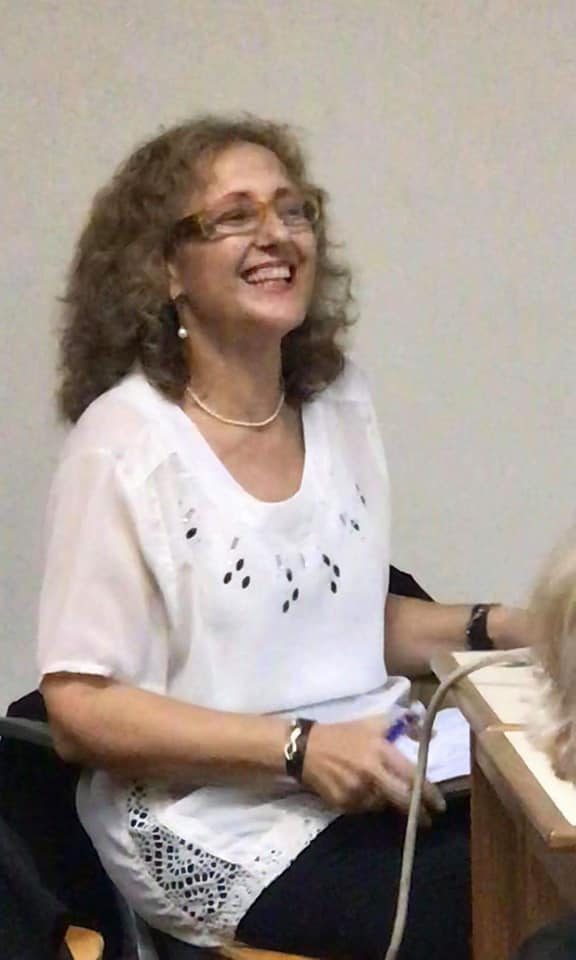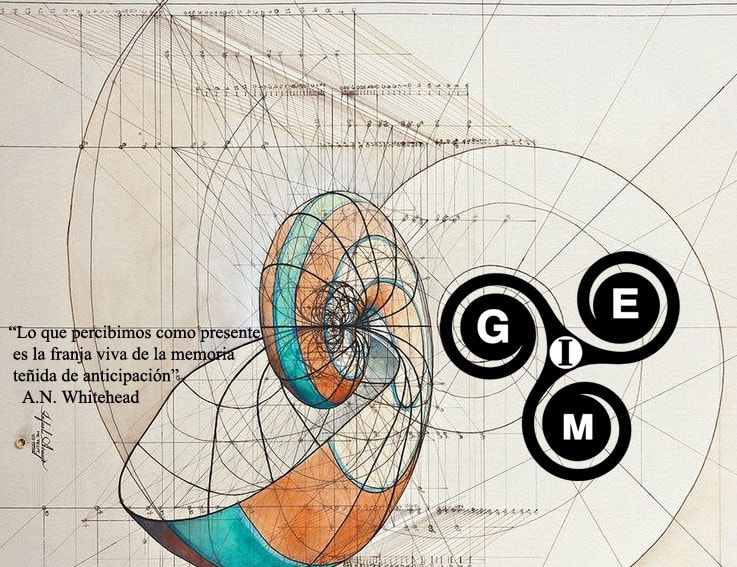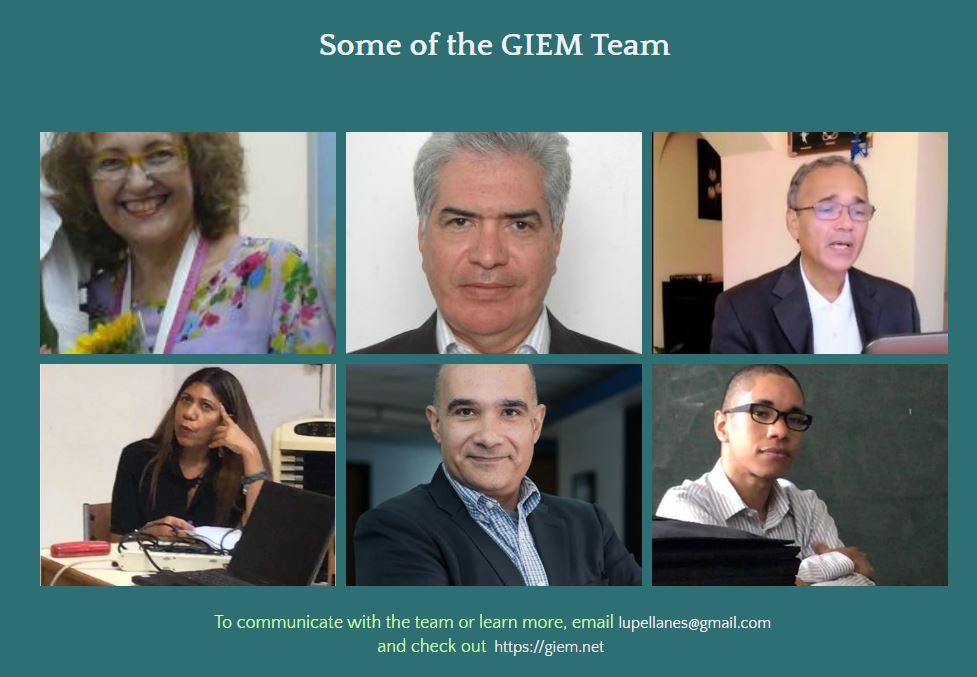Meet Dr. Lupe Llanes
Process Philosopher in Venezuela
Please click on button to learn more about the GIEM Research Team in Venezuela.
Dr. Jay McDaniel’s interview with Dr. María Guadalupe Llanes: Professor at the Central University of Venezuela.
Member of GIEM research group of Metaphysical Evolutions, June 03, 2020
1) Please, tell us a little about your background and interests? What experiences in your past led you to be interested in philosophy in general and process philosophy in particular?
I was born in Spain. Many years ago, my family and I move to Venezuela because my parents fell in love with this charming country, with beautiful geography, friendly people, great weather and full of opportunities. I came here with my first husband and my two year old son. Here I studied fine arts, but in my country I made oil painting since I was fourteen years old. At the Cristobal Rojas School of Visual Arts, my teacher Alirio Oramas told us that, nowadays every visual artist must be a philosopher. That sounded good to me because I wanted to fill my paintings with philosophical content. So years later I entered the Central University of Venezuela to study philosophy. I finished my degree, my Master, then begin to work as a Professor, and after that my PhD thesis advisor told me to read Whitehead’s Process and Reality. My chair, my professorship, was and still is philosophy of the Middle Ages, so just imagine: my Thomist brain exploded reading Whitehead as Garcia Bacca’s brain for the same reason. Now I can´t stop studying process philosophy.
2) Please tell us about the Venezuelan contex of your work. Many in the process community are interested in Venezuela, and would like to know more. What would you like for us to know?
Nowadays my University is suffering a serious crisis. Universities are victims of a sustained budget cut that impedes our progress as academics. Our spaces are frequently stolen, the infrastructure is damaged. We do not have good access to communication and information. Many, many teachers and students left the country. The classrooms are almost empty, some schools are in danger of disappearing. Our university once an again have to function without basic services like water and light. It’s a very difficult situation. But we are still here, doing the best we can.
3) What ideas in Process Philosophy do you find most interesting or helpful? What ideas do you find questionable or dubious?
The idea of creativity as a field that permanently drives the universe towards the new. The notion of reality in permanent process. The idea of a God with a primordial nature that offers all possibilities, while also consisting of a nature that suffers and shares with beings the evolution of the universe. A universe where all beings are equally important.
The notions of experience and feeling. Experience as kind of relationship in the concrescence of the new that characterizes the generation of all beings, from God to the smallest microparticle or energy beam. Experience has the clue to know how the past contributes in the formation of the present. Because, thanks to this kind of relationship is possible to explain causality. But we don´t have to confuse experience with consciousness. Consciousness is the specific kind of relationship of beings with a brain. Experience is the result of interaction between feelings. ‘Feeling’ is other whiteheadian term that we don´t have to use in an anthropomorphist way. My only concern is the danger of complete disappearance of substantial stability of things. And that’s the subject of my doctoral thesis, entitled: “Whitehead: Process and substance. A reconsideration from medieval philosophy”.
4) Please tell us about GIEM. We can go to the GIEM page in Open horizons and to the GIEM webpage, but we’d also like to hear about it from you. What do you appreciate about it? Do you have a sense of what the future holds for it? What are your own hopes for its future?
GIEM was born as a research group between like-minded friends. We are all interested in Process Philosophy from different personal approaches. Of course my advisor and I are part of GIEM, because we both produced my doctoral thesis on the notion of substance in Whitehead and the Middle Ages. We are the only team in Venezuela that deals with these topics, for now. GIEM is our personal oasis, our opportunity for epistemological and spiritual growth. Our goal is to get in contact with other research groups, learn, share knowledge and experiences with others. Open up to the world. We took the first step knowing you, process friends.
5) Is there a “way of living” which, in your view, parallels the process perspective, so that it is part of everyday life? What is that way from your perspective?
Living day by day from a process perspective means being aware that we are part of a whole, that we are as individuals related to everything that belongs to the enormous and complex structure that evolves and that we call the universe. And it’s because of this relationship that showing respect to any being in this universe means also respecting yourself and respecting the whole. For me, that’s what it means experiencing life from this perspective in each of our activities. Thinking that way, a person will be inclusive, resilient, peaceful, spiritual, hospitable, capable of maintaining joy when facing adversity, etc.
6) Some people draw a fairly sharp distinction between process theology and process philosophy. Others see them as overlapping. From your own perspective as an individual, how important is “religion” or “spirituality” in the process perspective? Is the idea of God important to you? How about the “spiritual alphabet” highlighted to Open Horizons?
Whitehead's cosmology includes in his philosophical explanation of the universe the idea of God, therefore it is a philosophy that has a natural theology as its foundation. There is no contradiction in this. After establishing the need for God as the ordering principle of the world, it is desirable to try to make a theological study about his nature. These are two disciplines that go hand in hand, they are not exclusive, not overlapping. Before reading Whitehead, my answer to the question: what do you want to know? was the same as Saint Augustine’s: I just want to know God and the soul, that is all. And I still think the same, but now I have more lights.
The Open Horizons spiritual alphabet is very complete and enlightening, I am starting to read it. There we can find a word for each letter of GIEM: G is for GRACE and GRATITUDE, I is for IMAGINATION, E is for ENTHUSIASM, and M is for MEANING. A good description for our project.
7) The social ideal of process philosophy these days is the development of ecological civilizations, the building blocks of which are local communities that are creative, compassionate, participatory, inclusive, diverse, humane to animals, and good for the earth, with no one left behind. Is this ideal relevant to a Venezuelan contex? Are there ways to practice it individually and collectively?
As I said, people here have some of those qualities. I think they need to learn how to take care of natural resources, for decades they lived in a fictional abundance as a result of oil income, and now under these awful circumstances they are learning to value basic things. But, there is also a part of the population that used to live in corruption and laziness, because of the populist political system of gifts in exchange for votes, and many other things. It will take a lot of educational work to polish these diamonds.
8) What questions do you wish I’d asked you, that I didn´t? Please ask them and respond. We want to hear about what is important to you?
I just want to express how I feel. I feel very, very, lucky because I was able to meet John Cobb, and you, Jay, in the reading of Process and Reality. I am happy to found a path of spirituality that goes beyond a closed cult and that can sink its roots into a rationality that challenges current science. I feel illuminated with a ray of hope. I wish to build an authentic friendship that transcends communication machines, with the incredible people that together with you feel the world from a processual perspective. I would like to create nexus of progress. And I want to continue learning, individually and with my team. Thank you, Jay.
Member of GIEM research group of Metaphysical Evolutions, June 03, 2020
1) Please, tell us a little about your background and interests? What experiences in your past led you to be interested in philosophy in general and process philosophy in particular?
I was born in Spain. Many years ago, my family and I move to Venezuela because my parents fell in love with this charming country, with beautiful geography, friendly people, great weather and full of opportunities. I came here with my first husband and my two year old son. Here I studied fine arts, but in my country I made oil painting since I was fourteen years old. At the Cristobal Rojas School of Visual Arts, my teacher Alirio Oramas told us that, nowadays every visual artist must be a philosopher. That sounded good to me because I wanted to fill my paintings with philosophical content. So years later I entered the Central University of Venezuela to study philosophy. I finished my degree, my Master, then begin to work as a Professor, and after that my PhD thesis advisor told me to read Whitehead’s Process and Reality. My chair, my professorship, was and still is philosophy of the Middle Ages, so just imagine: my Thomist brain exploded reading Whitehead as Garcia Bacca’s brain for the same reason. Now I can´t stop studying process philosophy.
2) Please tell us about the Venezuelan contex of your work. Many in the process community are interested in Venezuela, and would like to know more. What would you like for us to know?
Nowadays my University is suffering a serious crisis. Universities are victims of a sustained budget cut that impedes our progress as academics. Our spaces are frequently stolen, the infrastructure is damaged. We do not have good access to communication and information. Many, many teachers and students left the country. The classrooms are almost empty, some schools are in danger of disappearing. Our university once an again have to function without basic services like water and light. It’s a very difficult situation. But we are still here, doing the best we can.
3) What ideas in Process Philosophy do you find most interesting or helpful? What ideas do you find questionable or dubious?
The idea of creativity as a field that permanently drives the universe towards the new. The notion of reality in permanent process. The idea of a God with a primordial nature that offers all possibilities, while also consisting of a nature that suffers and shares with beings the evolution of the universe. A universe where all beings are equally important.
The notions of experience and feeling. Experience as kind of relationship in the concrescence of the new that characterizes the generation of all beings, from God to the smallest microparticle or energy beam. Experience has the clue to know how the past contributes in the formation of the present. Because, thanks to this kind of relationship is possible to explain causality. But we don´t have to confuse experience with consciousness. Consciousness is the specific kind of relationship of beings with a brain. Experience is the result of interaction between feelings. ‘Feeling’ is other whiteheadian term that we don´t have to use in an anthropomorphist way. My only concern is the danger of complete disappearance of substantial stability of things. And that’s the subject of my doctoral thesis, entitled: “Whitehead: Process and substance. A reconsideration from medieval philosophy”.
4) Please tell us about GIEM. We can go to the GIEM page in Open horizons and to the GIEM webpage, but we’d also like to hear about it from you. What do you appreciate about it? Do you have a sense of what the future holds for it? What are your own hopes for its future?
GIEM was born as a research group between like-minded friends. We are all interested in Process Philosophy from different personal approaches. Of course my advisor and I are part of GIEM, because we both produced my doctoral thesis on the notion of substance in Whitehead and the Middle Ages. We are the only team in Venezuela that deals with these topics, for now. GIEM is our personal oasis, our opportunity for epistemological and spiritual growth. Our goal is to get in contact with other research groups, learn, share knowledge and experiences with others. Open up to the world. We took the first step knowing you, process friends.
5) Is there a “way of living” which, in your view, parallels the process perspective, so that it is part of everyday life? What is that way from your perspective?
Living day by day from a process perspective means being aware that we are part of a whole, that we are as individuals related to everything that belongs to the enormous and complex structure that evolves and that we call the universe. And it’s because of this relationship that showing respect to any being in this universe means also respecting yourself and respecting the whole. For me, that’s what it means experiencing life from this perspective in each of our activities. Thinking that way, a person will be inclusive, resilient, peaceful, spiritual, hospitable, capable of maintaining joy when facing adversity, etc.
6) Some people draw a fairly sharp distinction between process theology and process philosophy. Others see them as overlapping. From your own perspective as an individual, how important is “religion” or “spirituality” in the process perspective? Is the idea of God important to you? How about the “spiritual alphabet” highlighted to Open Horizons?
Whitehead's cosmology includes in his philosophical explanation of the universe the idea of God, therefore it is a philosophy that has a natural theology as its foundation. There is no contradiction in this. After establishing the need for God as the ordering principle of the world, it is desirable to try to make a theological study about his nature. These are two disciplines that go hand in hand, they are not exclusive, not overlapping. Before reading Whitehead, my answer to the question: what do you want to know? was the same as Saint Augustine’s: I just want to know God and the soul, that is all. And I still think the same, but now I have more lights.
The Open Horizons spiritual alphabet is very complete and enlightening, I am starting to read it. There we can find a word for each letter of GIEM: G is for GRACE and GRATITUDE, I is for IMAGINATION, E is for ENTHUSIASM, and M is for MEANING. A good description for our project.
7) The social ideal of process philosophy these days is the development of ecological civilizations, the building blocks of which are local communities that are creative, compassionate, participatory, inclusive, diverse, humane to animals, and good for the earth, with no one left behind. Is this ideal relevant to a Venezuelan contex? Are there ways to practice it individually and collectively?
As I said, people here have some of those qualities. I think they need to learn how to take care of natural resources, for decades they lived in a fictional abundance as a result of oil income, and now under these awful circumstances they are learning to value basic things. But, there is also a part of the population that used to live in corruption and laziness, because of the populist political system of gifts in exchange for votes, and many other things. It will take a lot of educational work to polish these diamonds.
8) What questions do you wish I’d asked you, that I didn´t? Please ask them and respond. We want to hear about what is important to you?
I just want to express how I feel. I feel very, very, lucky because I was able to meet John Cobb, and you, Jay, in the reading of Process and Reality. I am happy to found a path of spirituality that goes beyond a closed cult and that can sink its roots into a rationality that challenges current science. I feel illuminated with a ray of hope. I wish to build an authentic friendship that transcends communication machines, with the incredible people that together with you feel the world from a processual perspective. I would like to create nexus of progress. And I want to continue learning, individually and with my team. Thank you, Jay.


